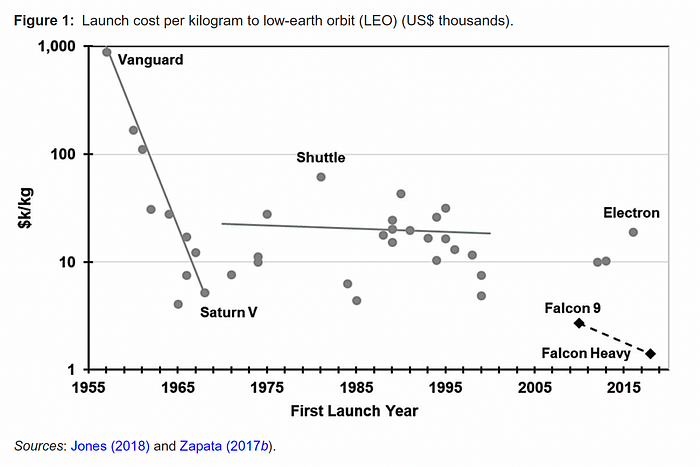Doesn't this show that Falcon 9 and Falcon Heavy (the to bottom circles on the cost axis) have reduced costs by ~5X since they came online?
No. FWIW that’s actually a difficult chart from which to extrapolate practical results. Normalizing dollars doesn’t really get to the bottom line, and its an over-read to suggest reduction over time is a significant function of Falcon 9. Ariane 5, for instance, is not and has never been 5x the price of Falcon, nor has its price been driven down 5x since Falcon’s introduction.
Minding the double negative, that is
not to say the competitors
haven’t cut their prices (to varying degrees) as a direct attempt to better compete with falcon, mind. They of course have. But we’re talking about the competitors cutting margins or finding cost efficiencies by small percentages.
It’s also important to understand is that cost per kg of a launcher doesn’t really matter when it comes down to a customer buying a rocket or even a number of rockets. The only thing that matters is the price of the launch service. Doesn’t matter if you’re launching 1 or 300 sats, 1T or 100T worth of stuff…what matters is the price to get your *sugar* on orbit.
For a basic, practical hypothetical, consider a very basic, big GEO. Call it $200M for the satellite (for reference, Viasat-3 is reported to be $650M), and 4-5T mass. That calls for an ASDS falcon at $67M. Or…that GEO could ride as a co-passenger on a $200M dual stack Ariane 5 (let’s call the A5 price $120M just to be really conservative).
Not factoring any other programmatic costs, that maths out to a ~20% stupid tax to fly on Ariane. Nobody’s kicking 20% out of bed of course, but that’s not a game-changing savings for that operator. That’s a nice upside. The fact that Ariane only launches like 5 times a year (or something) right now is the real differentiator.
For a different hypothetical, let’s look at Rivada. They’re [supposedly] building 300x 500kg sats for $2.3B, and have secured 12 F9 launches. Their other option would be to fly on [a very conservative] 8 $200M Ariane 5’s. Factor in LEAST $500M for infrastructure to operate the constellation in either case (which is way optimistic) and your Ariane stupid tax is ~21%. Again that’s for sure real money, but nobody is putting go/nogo of a $4B+ program on an additional 21% program cost.
While A5 is real, A5 is of course 25 years old. The same conservative Rivada comparison with A64 numbers puts the Ariane stupid tax at ~5%. Obviously there's plenty of room for F9 to drop prices as the new set of launchers comes on line, but again the point is that we're not talking game changing dollars here. We're talking pleasant upside.



